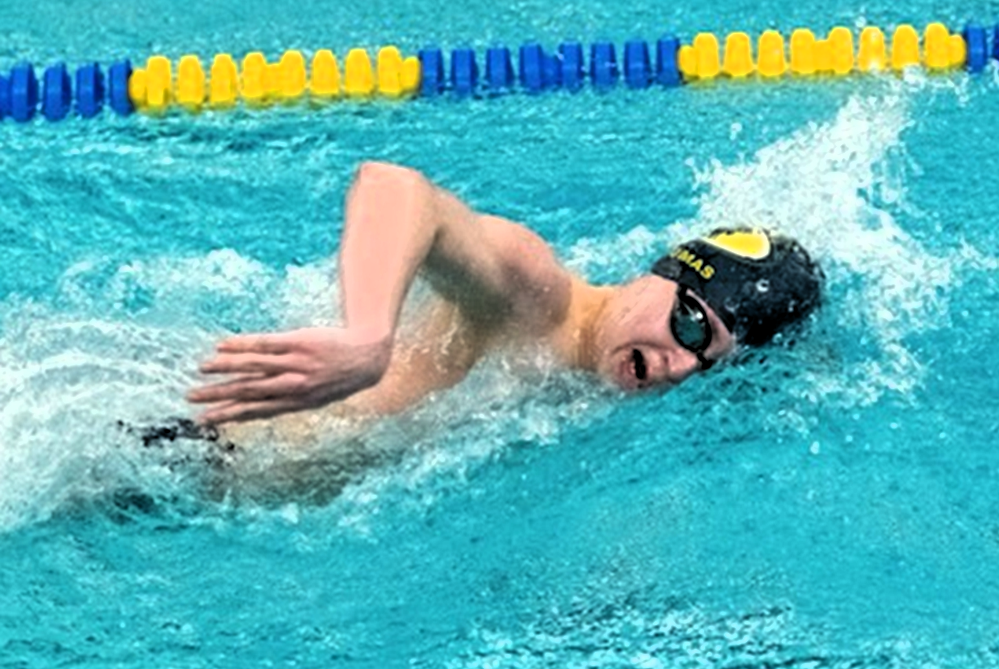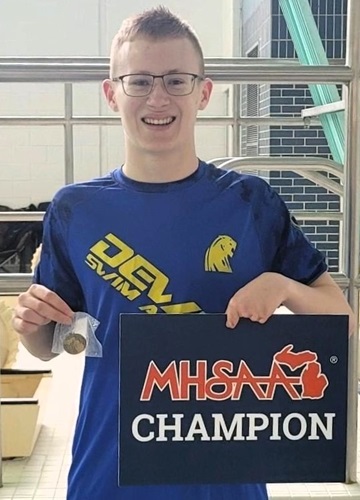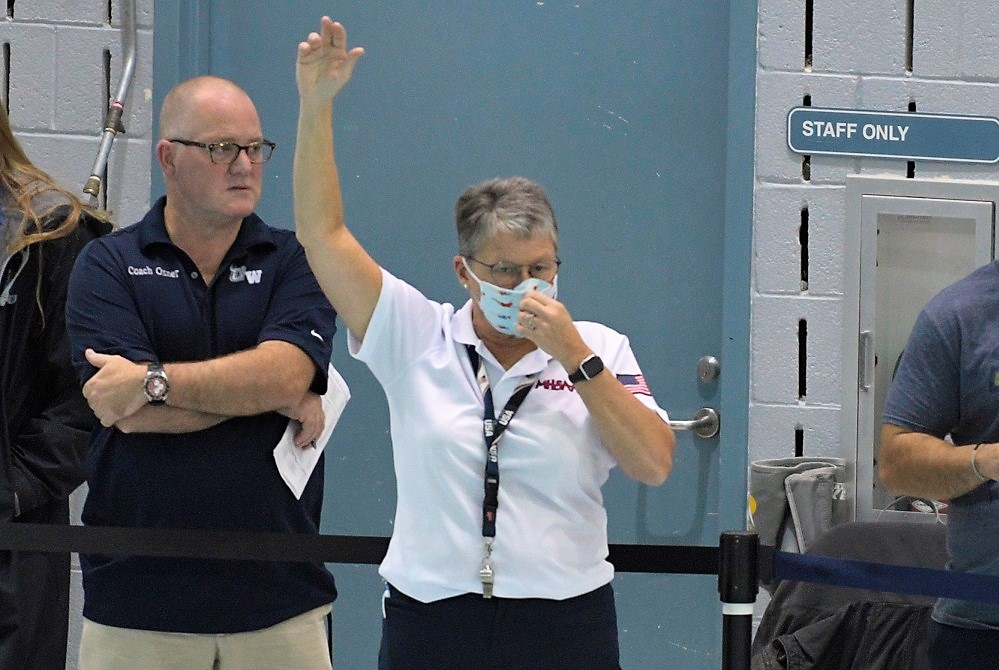
DeWitt's Thomas Blazes Swimming Path with Historic Finals Performance
By
Steve Vedder
Special for MHSAA.com
April 4, 2024
Aaron Thomas easily could have decided that swimming wasn't going to be part of his life.
 The DeWitt senior could've pieced together some combination of his other entertainment interests to fill his time. For instance, he could have spent more time with friends or immersed himself in video games. Or maybe devoted more time to a flirtation with golf or playing trumpet in the school band. Thomas also could have gained a head start on college and his ultimate goal of a degree in biomedical engineering.
The DeWitt senior could've pieced together some combination of his other entertainment interests to fill his time. For instance, he could have spent more time with friends or immersed himself in video games. Or maybe devoted more time to a flirtation with golf or playing trumpet in the school band. Thomas also could have gained a head start on college and his ultimate goal of a degree in biomedical engineering.
Considering the lifetime of challenges he's faced in swimming, those seemed more tenable options.
Instead, Thomas chose the tougher path.
"My life is swimming," he said. "I've been in water so much, I've never looked back."
By "looking back," Thomas means ignoring a disability that would have turned many youngsters away from the pool. He was born without 65 percent of his pointer finger on his left hand and with a thumb that's only about 90-percent intact. The other three fingers stop at the top of the knuckle. As DeWitt coach Brock Delaney explains, much of a swimmer’s success comes from the power of fingers and subsequent strength in the hands – and without that combination, swimmers are at an immediate disadvantage.
But rather than letting those obstacles keep him high and dry, Thomas has excelled and finished this season with a historic first. He qualified for the Lower Peninsula Division 3 Finals in the 200-yard individual medley and finished 29th and also competed in the Paralympic 100 freestyle exhibition event and topped all divisions with a time of 54.07 seconds. In doing so, Thomas became the first competitor to swim that combination at a Finals meet.
Thomas additionally this winter made DeWitt's Century Club of swimmers who have amassed 100 points in a season for the second time, and he has earned National Interscholastic Swim Coaches Association (NISCA) Paralympic All-American honors in the 200-yard freestyle (1:56.64), 200 IM (2:08.21), and 500 free (5:11.58). He also competes in Paralympic swimming as part of the Mid-Michigan Aquatics Club.
To some, the quest for those achievements likely would seem a long and difficult path. But to Thomas, it's business as usual. A disability? What disability, offers Thomas, whose ultimate goal is swimming in the 2028 Summer Paralympics in Los Angeles.
"I've always loved swimming," he said. "When I'm in the water, I never worry about anything. I just feel free."
 And Thomas has found a way to even the playing field, Delaney said.
And Thomas has found a way to even the playing field, Delaney said.
"He's such a hard worker who has made up for a left-hand deficiency," Delaney said. "He's legit, a strong kid who loves to swim. "
But determination can take a swimmer only so far. Delaney said Thomas, classified as an S10 swimmer for Paralympic events, has developed physical strategies to increase his performance. In the backstroke, for instance, Thomas swims with his left hand underwater to help in propulsion. For speed, Thomas tries to keep his body on his "power side."
The rest, Delaney said, is simply heart.
"He moved here from Alma between his eighth grade and freshmen years," he said. "If not our hardest worker, he's in the top three. He's got something not all athletes have."
Thomas said one of the chief reasons he spends so much time around pools is the type of person he finds there. He describes people who combine encouragement and understanding with a will to compete despite any perceived physical shortcomings. What he's learned from them not only explains his swim career, but teaches valuable life lessons as well.
In fact, Thomas' career plans, beginning at Hope College in the fall, include securing a degree in biomedical engineering with an ultimate plan to help build prosthetics.
"Getting to know people in the prosthetic field really interests me," he said. "Swimming and prosthetics have been a nice tie-in with school. Prosthetics ties it all together for me."
Thomas said he can think of only a single instance where he questioned whether he should follow his love of swimming. But that thought quickly passed, and he's thrown himself into the sport ever since.
"I wouldn't trade my disability for the world," he said. "It's given me so many opportunities. The whole club and school thing and getting to the state meet never would have happened.”
Thomas will swim at Hope, and his goal is to qualify for the 200 IM at the Los Angeles Paralympic games. Thomas estimates he's within 15 seconds of qualifying in that meet's long course event.
"It's achievable," he said. "For sure it's doable."
Whether he makes it to Los Angeles or if his swim career quietly winds down, Thomas, who describes himself as competitive, said he still will have gained something for which everyone strives, athlete or not.
"Water has always been a safe spot for me," he said. "I think I've always used it as kind of a break from life. It helps clear my head.
“I've always been taught that you get out of work what you put into it. Work always pays off in the end. I've always remembered that.”
PHOTOS (Top) Aaron Thomas races for the DeWitt swimming & diving team. (Middle) Thomas posted the fastest time across all divisions in the Paralympic 100 freestyle exhibition at this season’s Finals. (Photos provided by the DeWitt swimming & diving program and Thomas family.)

Be the Referee: Swim Turn Judges
By
Sam Davis
MHSAA Director of Officials
November 8, 2022
Be The Referee is a series of short messages designed to help educate people on the rules of different sports, to help them better understand the art of officiating, and to recruit officials.
Below is this week's segment – Swim Turn Judges - Listen
Did you know the officials in swimming do more than make sure everyone dives in at the same time?
Each race has a turn judge who is positioned in line with the end wall. Their job is to make sure each swimmer is executing the proper stroke during his or her turn.
For example, if you are swimming the individual medley and are in the backstroke lap, you must turn while using the backstroke. You can’t go into the breaststroke while turning. If you do, the turn judge will signal to the referee by placing one hand overhead with an open palm, and then report it to the referee after the conclusion of the race.
The referee will then decide if the turn was legal or if the swimmer should be disqualified.
Previous Editions:
Oct. 25: Soccer Referee Jersey Colors - Listen
Oct. 18: Cross Country Tie-Breaker - Listen
Oct. 11: Soccer Shootouts - Listen
Oct. 11: Safety in End Zone - Listen
Oct. 4: Football Overtime Penalty - Listen
Sept. 27: Kickoff Goal - Listen
Sept. 20: Soccer Timing - Listen
Sept. 13: Volleyball Replays - Listen
Sept. 6: Switching Sides - Listen
Aug. 30: Play Clock - Listen
Aug. 23: Intentional Grounding Change - Listen

